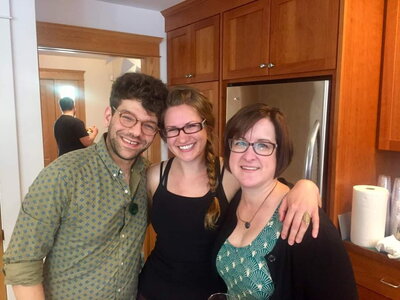
Please join the Neuroscience Program in welcoming Michelle as our new Program Coordinator. After Sam Beshers retired in June 2020, the Neuroscience Program took a year to review the position and determine how to best fill a spot left vacant by a very beloved coordinator who had committed over 15 years of service to the Program.
We have been very fortunate to find Michelle, former Assistant Professor of Neuroscience at Lafayette College who began this past July 1st. Please read below to learn more about her. Michelle is located in Beckman Institute 2321, next to the Neuroscience Program Faculty and Student Lounge.

NSP Program Coordinator (Far Right)
Career
- What made you choose to work at the University of Illinois? The program is one of the top neuroscience programs in the nation, so it was pretty much a no brainer! I respect the program’s strong commitment to diversity and inclusion and its interdisciplinary nature. During my interview, I was impressed with how friendly and open everyone was.
- You specialize in physiology, what made you interested in studying that specific subject versus others? I would consider myself more of a behavioral neuroscientist, since I most interested in the neurobiology of social behavior. I chose this area because I have always been first and foremost curious about behavior—why do we form complex social relationships and how does our underlying neural circuitry permit such relationships?
- What are you most excited for in regard to your new position? Graduate school was a tough, but rewarding, phase in my life and I look forward to assisting students through those tough phases. I also look forward to recruiting students from diverse backgrounds and am excited to help students develop both personally and professionally (developing CVs, writing grant proposals, etc.).
- What impact do you hope to have on the Neuroscience Program? I plan to increase diversity and maximize inclusion efforts. I also hope to contribute to the successes of all students in the neuroscience program and, as a result, even further strengthen the neuroscience program.
- Have you had any major setbacks in your career? How have you overcome them? The life of an academic always has setbacks, I think. My earliest setback was in graduate school. I had decided to do a developmental study in rhesus macaques (I definitely don’t recommend doing such a lengthy project!). In our first year, our lab encountered some problems with the prenatal androgen treatment we were administering, so it set me back an entire year! There were times when I dreamt of quitting graduate school and opening up a bookstore. Thankfully, I persevered!
Personal
- How do you spend your free time? I enjoy getting outside and taking walks; I maintain an exercise routine. I like to cook and try out new recipes. Also, there is a drive in near me that screens old horror movies and I frequently go there with friends. For example, over Memorial Day weekend, they are showing a bunch of zombie movies from the 1960s to 1980s and I definitely plan to attend.
- What is your favorite place on campus/ Which place are you most excited to visit on campus? Unfortunately, due to the pandemic, I have not visited the campus! I look forward to seeing what campus has to offer! Everyone has talked up the Beckman Institute, so I am excited to see it in person.
- What achievement are you most proud of? (academic or personal) Training 4 first generation college students at Wayne State University who went on to get PhDs in top neuroscience labs (2 are pictured in my photo; I am the one on the right). It’s so rewarding to see how positive lab experiences can set individuals up for long-term success.
- What is the best piece of advice you have given or received? The best piece of advice I received: graduate school will likely take longer than you expect, because things will come up that are outside of your control. My former students have told me that the best piece of advice I have ever given them is, when faced with an overwhelming task (e.g. writing a dissertation), break it up into smaller, manageable tasks and attack them bit by bit (e.g., it’s a low energy day today, but I do have the energy to make tables or write part of my method section).
- What is your biggest motivation? My commitment to bettering the lives of students; meeting them where they are and getting where they need to be. I look forward to getting to know all of you!